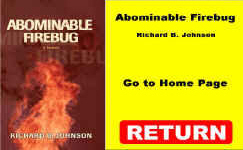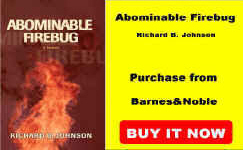
| I read this extraordinary book
through the critical lenses of teacher, clinician, and
professor. My twenty-three-year professional career has
been dedicated to educating students similar to those
described in these pages, and training the teachers and
administrators who work in the schools these students
attend. I do have another interest in this book, however. The author, Richard B. “Dick” Johnson, is my neighbor in a small, sleepy, suburban town in Massachusetts. My children have grown up listening to the mischievous stories of the “Bad Momber.” Dick joins us for evening coffee, Christmas morning, holiday meals, and lengthy, heated discussions of local Yankee politics. He might be characterized as anyone’s average neighbor next door. However, I would never use the descriptor “average” in the same sentence with Dick’s name. He is brilliant—a genius I suspect—although I have no quantitative proof. As you the reader will know from reading the account of his early life, Dick’s life experiences were far from average. This book will reveal the appalling realities of the juvenile detention system. At the same time, however, this book will give you hope. It is clear that mentors made a grand difference in Richard B. Johnson’s life. Dick succeeded in spite of his gruesome experiences. You can learn from this autobiography and become a better teacher, clinician, probation officer, or counselor. You can understand that behavior is an expression of feelings that cannot be expressed in words. You can have hope that the kids that are not the easiest to care for or understand can and do grow up to be successful adults with the guidance of dedicated adult mentors. You can take it upon yourself to reach out to these kids in a meaningful manner. |
|
(1) Dick’s total love of his family despite their rejection
(2) The resiliency of youth
(3) The need to be loved and important to others
(4) The role of mentors, and
(5) The manner in which a reputation follows a person over years
These five themes are essential for human service workers to understand, so that they can better serve the clients with whom they work. This amazing, descriptive work sets the scene for understanding these critical themes.
Despite Dick’s horrific experiences, he would be considered a highly successful adult when held against any standard. As an accomplished engineer, he has developed sophisticated, complex systems. That requires dedication, persistence, intelligence, and tenacity. He is well-read, well-informed, and extremely interesting. He is a pilot, plumber, electrician, mechanic, musician, and carpenter. He has a great love and affinity for fixing things. He is kind to people in need.
Dick is an inspiration. By capturing his experiences on paper for all to read, he breathes new hope into the desperate lives of disaffected youth. Dick gives a loud voice to many who have remained silent.
Whether a professional caregiver, parent, or friend of youth at risk, we owe it to all these children to share the knowledge we gain from Dick’s book. Read this book and share it with others. Open people’s eyes to the harsh realities of those children locked and tossed away, and share their worth and potential.
Dr. Mary A. Clisbee, Executive Director, Merrimack Special Education Collaborative, Massachusetts
Johnson tells about his stay at the Lyman School and goes into quite complete detail about the day-to-day activities at the school. Johnson thinks this institution was really quite good by comparison to other places he had been. Johnson then goes to another foster home, Charles Hayden Goodwill Inn, in Boston. While attending school in Roslindale, Johnson stumbles onto some missile secrets while preparing for the Science Fair. A federal judge took his Science Fair project away (no, he was not making a nuclear missile) when his high school teacher got him an audience with a military contractor. With only a couple weeks left, Johnson makes another project and wins well enough so that he gets to show his project in the state Science Fair and he gets another slap on the face.
Anyway, the book continues with Johnson encountering various challenges, which he faces and handles with true grit, an honest-to-goodness survivor. The book ends after Johnson enters the radio and television industry, gets a union job, and meets his first true love.
This is a book about success. It is well written and once you start it, you won’t want to put it down. I like the fact that Johnson wastes little time in developing a story so you can read the book in a single sitting. Each chapter, except the last, begins with a picture that hints of the chapter content. I don’t think this was an oversight. The last chapter doesn’t have a picture because it hasn’t ended yet. I think this book is excellent in all ways.
He was obviously a young man with what nowadays in social science circles would be called “issues”, but he also had obvious worth beyond the average. I sensed that his past might have included problems such as those he details in his book - after all, I was an orphan from the age of sixteen myself, and met a few unsympathetic people along the way to adulthood who wanted to build their ego at the expense of mine.
I give thanks to whatever instinct has led me, for the most part, to be helpful to others when I can. Those instincts have never been easier to obey or better rewarded than when I did what I could to ease Dick’s survival and career forty years ago.
If you are interested in electronics, education, kids, governmental bureaucracy, recent American history, or just aggregate humanity - you should read this book. You will be better qualified to understand and relate to your fellow men, an eminently worthy goal.
Ray Dowell
Ray Dowell was a very important mentor in my book... RBJ
Nowadays Dick Johnson is in the happy position of following the counsel of the novelist who told us living well is the best revenge, but his book concerns itself principally with his early years when happenstance - primed, perhaps, with a little precocious genius - led him into encounters with some Massachusetts Dotheboys halls and some vile public servants. He is also careful to tell us that he ran into some decent and helpful souls along the way who will rejoice that, from surprisingly young adulthood, Dick found his bootstraps and lifted himself into full participation in the marvelous opportunity that is American life.
This reviewer can vouch for the truth of Johnson’s story, and hopes a great many people will take advantage of the opportunity to learn from and be genuinely entertained by this unusual chronicle.
Celebrity autobiographies rarely reveal any surprises. I once discovered that my next-door neighbor was an (illegal) arms dealer who lived a fascinating life. Ordinary people who often aren’t so ordinary are much more interesting. This book proves it.
I was raised in a fully functional family. To read about anyone who didn’t have the same luxury always grabs my attention because it’s so unfamiliar to me. I never got in trouble (boring life), so I’m always interested in how I should do it in the next life.
This is a fascinating story of a young boy going through the wringer of the Massachusetts juvenile “correctional” system and coming out the other end as an amazingly versatile adult. I won’t tell you the ending, but just say that, if your kid is harder to handle than you’d like, have faith. You may have the makings of a Nobel prize winner on your hands.
Rich Wood was a teenage prodigy radio announcer in my book... RBJ
I always wanted to know what really went on at those horrible places. Mr. Johnson’s book sheds new light on a very dark subject. I recommend this book to anybody old enough to read. It should be required reading for any of the so-called social service workers. It should also be required reading for any cop on any police force anywhere.
This book describes the disastrous treatment of a young boy/man who happened to be born to a matriarch who was uncomfortable with having a son. Mr. Johnson is ostracized by for simply trying to grow up in a family with a mother who would not accept him as a family member. As fate had it he was sentenced to ‘Youth in Prison’ where he was abused, amused and educated under the state of Massachusetts youth laws of the 50’s and 60’s. The descriptive passages clearly paint a picture of a young man caught in a system he neither can control or get out of. However he does manage to make something of himself despite the odds against him. Hopefully the people who are currently involved in youth services will read this and learn from past mistakes.
Johnson goes into great detail about the day-to-day activities at the reform school, the very first one in the United States. A true survivor, Johnson is paroled home after completing his sentence, only to return to the reformatory because his mother told his parole officer that he “stole” (now I’m not kidding here) some ice cream from her refrigerator.
You would think that a teenager’s life couldn’t get any worse than that, but it does! Eventually, after much trial and tribulation, Johnson moves to another institutional foster home in Boston where he starts to see the light at the end of the tunnel, but it was a long hard pull crawling through. He even had a science fair project taken away because the government thought it violated national security. Undaunted, Johnson completes another project in about two weeks.
Anyway, the book has a nice ending. It’s well written and a pleasure to read. Johnson is an expert stylist and his chapters are short with each headed by a picture. There are several remarkable poems and, at several places Johnson reflects upon an important metaphorical gateway, writing prose which reads like poetry.
One of Johnson’s mentors, a chaplain at the reform school, writes the afterword of this book. This is also well written and quite uplifting.
Like reform schools of yesteryear, today’s “boot camps” reflect a culture where “anything goes” in dealing with children labeled “incorrigible.”
They make the headlines when something goes terribly wrong: A child dies at the hands of guards administering “tough love.” A child collapses from dehydration during an outing of “character building.” For the most part, these are children-predominantly boys-who have not been convicted of crimes serious enough to warrant imprisonment. Because no one likes the idea of sending children to prison, there is a level of “treatment” for children that flies in the face of what most people consider basic human rights. These are America’s throwaway children, consigned by families or courts to facilities that purport to offer alternatives to “straighten out” children who seem to be in a downward spiral, from first-time offenders to incorrigible truants.
While this new breed of facilities for dealing with troubled children has been making news, the underlying philosophy is an old one. Richard B. Johnson, author of the new release Abominable Firebug: A Memoir is one of the few who has come forward to share his story in hopes to shed light on the crisis. Accused of arson as a child and imprisoned without trial at the notorious Roslindale juvenile detention center in Massachusetts, he subsequently spent years at the nation’s first reform school, the Lyman School for Boys, in the 1950s. While the institution became infamous for hatching Albert DeSalvo, an adolescent inmate who “graduated” to become the Boston Strangler, Johnson tells unflinchingly of not only the many weaknesses of that institution, but also of the rare opportunities and occasional mentors that allowed him to become in later life an accomplished engineer, pilot and inventor.
Unfortunately, many children who have survived, and even thrived, in adulthood rarely publicly admit a troubled past; staff members who have found ways to make a difference are reluctant to risk being linked with institutions whose names are synonymous with abuse. Thus, valuable experience that could bring about meaningful change is usually hidden.
Throughout the 20th century, there were various vogues for dealing with “incorrigible” children, including forced labor camps and reform schools. Over time, horror stories surfaced that attracted the attention of reformers, creating a public outcry that shut them down. “What has never been resolved, however, are the underlying issues: a willingness to ignore the rights of the children in order to protect society from potential miscreants, and a culture of closed ranks combined with generally low pay for staff that results in an unfortunate percentage of brutal or simply untrained staff,” says Johnson.
“Many people don’t really care what happens to the nation’s youth when they get in trouble with the law,” Johnson says. “And many people who are in the ‘juvenile corrections’ industry deny that there remain any problems at all. Many of the problems of the ‘50s and ‘60s are just papered over. It’s not much better now, because the juvenile court system does not use the same protocols or rules of evidence they would when trying adults. Children are simply second-class citizens, and if the child is nonwhite, he is even further removed from true citizenship. An extremely damaging environment is suffered by children when they are not considered to have any rights, and we are failing our children by not creating more of a public outcry.”
Unlike crime, juvenile delinquency is not a high-profile issue in this country. “Basically it’s an out-of-sight, out-of-mind situation for most of the public,” says Johnson. “The general public needs to know something about these institutions. At the same time, we need to validate the many people who have dedicated their lives to helping displaced children, despite tremendous odds.”
Richard Johnson is an incredibly bright person, showing genius in both engineering and music. It was those qualities that were a major factor that allowed him to succeed in life despite the enormous odds. The other factor was the few people that he encountered that gave him a chance and showed him kindness. He speaks with great fondness of those people and rightly so. They went so far out of their way and against his reputation to let him do things. Those people are mentioned and should be commended.
The book is also a look back to a time in America that was quite different from the modern age. Johnson describes how the police would beat him whenever they thought they could get away with it. That attitude among the police was not isolated to the eastern Massachusetts area. My friends and relatives described being beaten at the hands of the local police for minor offences, but only when the police felt that there was no risk. Generally this meant that the one being beaten didn’t have a respectable parent or other protector who would mount a fierce objection.
Young men were also thrown into a system that was really more a form of incarceration rather than assistance. They had little to no rights, judges could do what they wanted and any attempt at rehabilitation was a consequence of the initiative of individual people.
Fortunately, Johnson survived all of this, becoming successful and having the courage to write about it. He is to be commended for that, many people would have been content to simply be successful.
Are you really a firebug if the flames are the result of miscalculating the angle of a rocket’s descent?
And if that rocket lands on a barn and burns it to the ground, do you really deserve to go to reform school until you’re grown? Richard Johnson was barely in high school when, after giving in to a fascination with rockets, he set off a homemade one and listened in horror as animals screamed and flames roared. Because it wasn’t his first fire, Johnson was automatically, under Massachusetts law in the 1960s, labeled incorrigible and sent away from his family. But actually, his family didn’t much care that he was gone. His mother, he writes, never allowed him in the living room except once a week to clean it, wouldn’t let him come in through the front door, and was always terrified he would do something to hurt his two sisters. Even so, he said, he loved her dearly and often wished he could live at home. But at the same time, he was grateful that reform schools existed because otherwise, “Where would I have gone?” Before he turned 18, Johnson had lived in two foster homes, a detention center, and a reform school. Sometimes the food was good, sometimes it was bad. Sometimes there were good adults around, and sometimes there were bad people who attacked him. He was beat a lot, and molested several times by staff and fellow inmates alike. And still he persevered, growing up to live what he terms “a successful life” as an engineer, a musician and a pilot.
There’s a bit of technical jargon in this book, as Johnson talks about his fascination with ham radios, rockets, coiled plastic-covered antennae and such, but as he says, the book is written by “a high-school dropout, and is easy to read.” The lengths he went to in order to educate himself are well worth reading about. How many people in reform school have an FCC second class radiotelephone license, an elevator operator’s license, a journeyman’s projectionist’s license and a driver’s license before the age of 18? Johnson took note of his life, which was hard and lonely, and made something of it, something that brings him pride. Read the book and revel in one boy’s gift to himself of a worthwhile life filled with hope.
Susan Woolsey
Staff Writer
Like reform schools of yesteryear, today’s “boot camps” reflect a culture where “anything goes” in dealing with children labeled “incorrigible.”
They make the headlines when something goes terribly wrong: A child dies at the hands of guards administering “tough love.” A child collapses from dehydration during an outing of “character building.” For the most part, these are children-predominantly boys-who have not been convicted of crimes serious enough to warrant imprisonment. Because no one likes the idea of sending children to prison, there is a level of “treatment” for children that fly in the face of what most people would consider basic human rights. These are America’s throw-away children, consigned by families or courts to facilities that purport to offer alternatives to “straighten out” children who seem to be in a downward spiral, from first-time offenders to incorrigible truants.
While this new breed of facilities for dealing with troubled children has been making news, the underlying philosophy is an old one. Richard B. Johnson, author of the new release Abominable Firebug: A Memoir is one of the few who has come forward to share his story in hopes to shed light on the crisis. Accused of arson as a child and imprisoned without trial at the notorious Roslindale juvenile detention center in Massachusetts, he subsequently spent years at the nation’s first reform school, the Lyman School for Boys, in the 1950s. While the institution became infamous for hatching Albert DeSalvo, an adolescent inmate who “graduated” to become the Boston Strangler, Johnson tells unflinchingly of not only the many weaknesses of that institution, but also of the rare opportunities and occasional mentors that allowed him to become, in later life, an accomplished engineer, pilot and inventor.
Unfortunately, many children who have survived, and even thrived, in adulthood rarely publicly admit a troubled past; staff members who have found ways to make a difference are reluctant to risk being linked with institutions whose names are synonymous with abuse. Thus valuable experience that could bring about meaningful change is usually hidden.
Throughout the 20th century, there were various vogues for dealing with “incorrigible” children, including forced labor camps and reform schools. Over time, horror stories surfaced that attracted the attention of reformers, creating a public outcry that shut them down. “What has never been resolved, however, are the underlying issues: a willingness to ignore the rights of the children in order to protect society from potential miscreants, and a culture of closed ranks combined with generally low pay for staff that results in an unfortunate percentage of brutal or simply untrained staff,” says Johnson. “Many people don't really care what happens to the nation’s youth when they get in trouble with the law,” Johnson says; “And many people who are in the ‘juvenile corrections’ industry deny that there remain any problems at all.”
Unlike crime, juvenile delinquency is not a high-profile issue in this country. “Basically it’s an out-of-sight, out-of-mind situation for most of the public. At the same time, we need to validate the many people who have dedicated their lives to helping displaced children, despite tremendous odds.”
 |
 |
 |
 |
 |
 |
